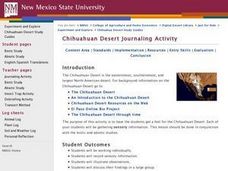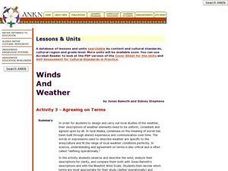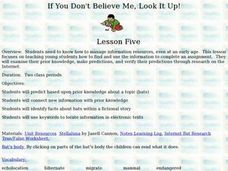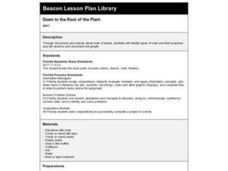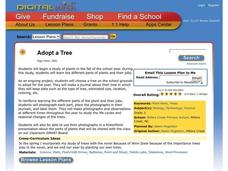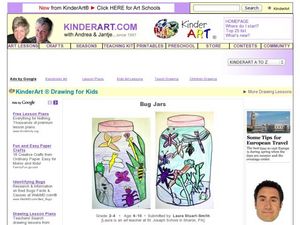Curated OER
Chihauhan Desert Journaling Activity
Students explore U.S. geography by completing an observational activity with classmates. In this New Mexico lesson, students research the Chihuahuan Desert by visiting several Internet sites. Students write the data they've collected in...
Curated OER
In the Field with Salamanders
Students observe salamanders, take pictures of them, and classify them into an online format. In this animal classification instructional activity, students use collection materials and digital camera to photograph and observe...
Curated OER
Agreeing on Terms
Students observe and describe the wind, analyze their descriptions for clarity, and compare them both with Jonas Ramoth's descriptions and with the Beaufort Wind Scale. observations.
Curated OER
Mapping Possible Solutions
Fourth graders propose possible sites for the heart of Florida state capital by mapping collected data onto a Florida state map and recording data in a Travel Log.
Curated OER
Just Bee-Tween Flowers!
Learners examine the major plant and bee parts and the interdependency between bees and fast plants. They observe and record the stages of growth of fast plants, take photos of the plant's life cycle, and cross-pollinate plants.
Curated OER
Wait, They Can do it by Themselves?
Students recognize the concepts of evolution and natural selection as well as cladistics and phylogenetics. They observe the process of regeneration in a sea anemone to simulate asexual reproduction.
Curated OER
Drift Study
Students observe, work with charts, and work with GPS in order to determine the path lobster larvae travel based on local currents. In this currents lesson plan, students work with local fishermen to observe the natural currents.
Curated OER
Name-Calling in Our School
Students objectively observe the way in which name-calling and other types of disrespectful language are used in school over a three-day period. They then reflect on their observations to look for patterns of behavior and to begin to...
Curated OER
Water and Ice
Students explore the states of matter. In this physical science lesson plan, students observe what happens to water when it freezes and record observations. Students then observe ice when it melts and record observations.
Curated OER
Desert Tortoise Adaptations
Students observe the Desert Tortoise in its natural surroundings. For this adaptations lesson, students study and take pictures of an animal in its habitat, then design a PowerPoint which addresses adaptations, biodiversity, and threats...
Curated OER
Dead Trees Alive! Nature Notebook
In this tree worksheet, students find a dead tree or rotting log, describe it and look for signs of living things near it and all animals they find below it.
Curated OER
If You Don't Believe Me, Look It Up!
Students learn about bats. In this bats and comprehension lesson, students read Stellaluna and share what they know about bats. Students complete a learning log and Internet bat research worksheet.
Curated OER
Changing Weather: Comparing Climate from Voyageur Times to Today
Fifth graders compare climates. In this weather lesson, 5th graders observe and record weather observations and discuss the impact of weather on people. Students also discuss the concept of global warming and determine how weather...
Curated OER
Down to the Root of the Plant
Second graders identify types of roots and their purposes and observe and document root growth. students observe their roots once a week and measure them to see if there has been any change. Each student keeps a written log of the...
Curated OER
Adopt a Tree
Students adopt tress on their school campus for scientific observation purposes. In this tree science lesson, students adopt a tree at their school, observe the season changes for the tree, and create a PowerPoint presentation about the...
Curated OER
Bug Jars
Students explore symmetry. Students observe a variety of bug and plant drawings, then draw a bug jar. Students observe bugs from the top of the jar for a symmetrical view, and the side of the jar for an asymmetrical view. Students draw...
Curated OER
Endosymbiosis: A Friend Within
Young scholars research the ecological principle of symbiosis. Using a microscope, students observe the relationship of mutualism between termites and flagellates. Young scholars examine a live termite and protozoans. They discuss the...
Curated OER
Biodiversity in Illinois-Pond Habitats
Second graders construct a pond habitat in the classroom using a small swimming pool partially filled with water, real cattails, a tree log adjoining, and plastic animal life appropriate to a pond setting. They examine the frog in detail...
Alabama Learning Exchange
Botany Scavenger Hunt Where's the Ginkgo?
Learners use a science journal to log plants that are native to Alabama. In this plant lesson plan, learners identify characteristics, describe environments, and classify the plants that they find.
Curated OER
Irregular Word Fluency, Line it Up
First graders use teacher created irregular word cards to build fluency through a game. In this irregular word cards instructional activity, 1st graders reply to the teacher when their assigned word card is called. Students mastery or...
Curated OER
Testing Density of Various Soap Products
Students have the opportunity to observe, measure and analyze the density of aerosol shaving creams and foams generated from shampoo and dishwashing liquids or detergents.
Curated OER
2005 Submarine Ring of Fire Expedition: What's for Dinner?
Young scholars compare and contrast photosynthesis and chemosynthesis as sources of primary production for biological communities, and describe sources of primary production observed in biological communities associated with volcanoes of...
Curated OER
Give a Hoot - Don't Pollute at Black Bayou Lake
Fourth graders visit Black Bayou Lake refuge to observe the effects of land and water pollution. They photograph examples of pollution. They list the effects of land and water pollution. They write a persuasive letter to convince others...
Curated OER
Assembling A Story
Students observe, discuss, and interpret Radcliffe Bailey's work "By the River" by creating a personal narrative of the 18th or 19th century. Internet access is required and related links are offered for teaching aides.
Other popular searches
- Observation Log Sheet
- Science Observation Log?
- Teacher Observation Log
- Science Observation Log
- Observation Log Plants
- Moon Observation Log
- Observation Log for Infants
- Lunar Cycle Observation Log
- Sky Observation Log
- Weather Observation Log
- Lunar Cyle Observation Log
- Plant Observation Log


